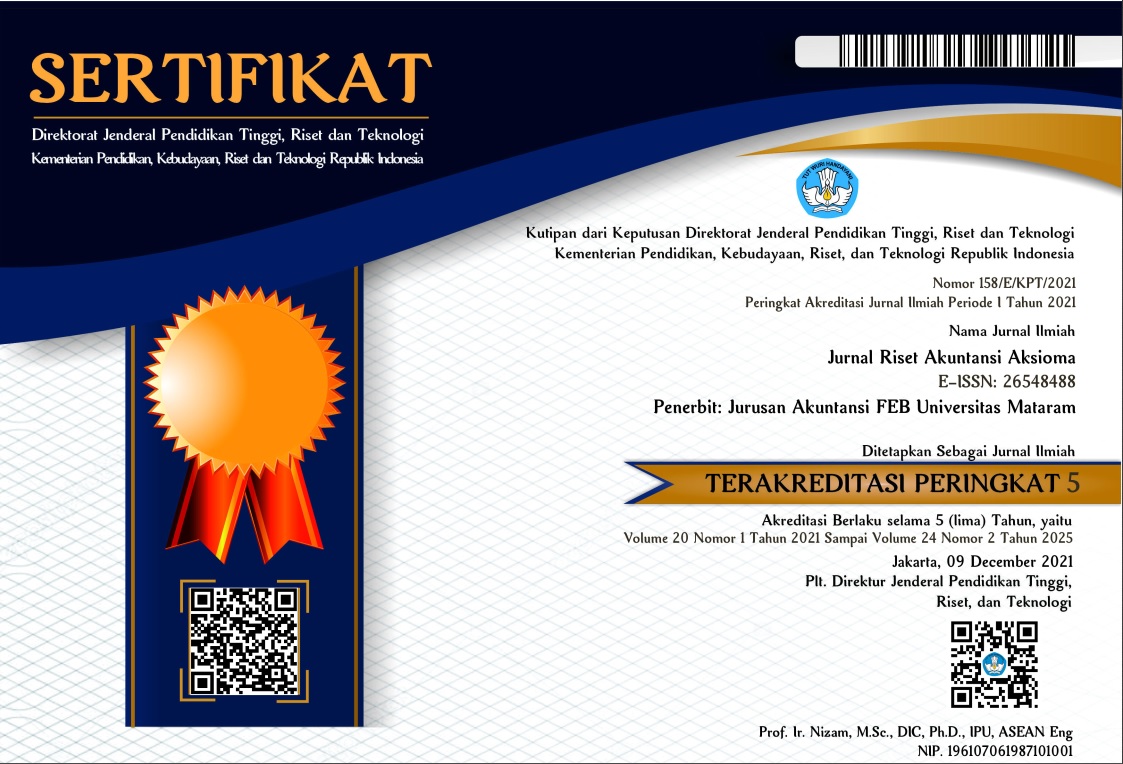KONSEKUENSI MANAJEMEN LABA, TATA KELOLA DAN TANGGUNGJAWAB SOSIAL TERHADAP REPUTASI PERUSAHAAN
Abstract
The objective of this study is to examine the earnings management consequences, good corporate governance, and corporate social responsibility toward company reputation. Research population is manufacturing companies listed in Indonesia Stock Exchange during 2013-2014. Pursuant to purposive sampling method, the study obtained 31 companies as sample of the study since not many companies have reputation data. The result of the study found that only good corporate governance improves the company’s reputation, while earnings management consequences and corporate social responsibility were found to have no influence on company reputation.
References
Bhattacharya, C. B., & Sen, S. 2003. Consumer-company identification: A framework for understanding consumers’ relationships with companies. Journal of Marketing, 67(2), 76–88
Bayoud,N.S.and Kavanagh ,M. 2012, “Corporate social responsibility disclosure: evidence from Lybian managers”, Global Journal of Business Research, Vol. 6 No. 5, pp. 73-83.
Benoit-Moreau, F. and Parguel, B. 2011, “Building brand equity with environmental communication: an empirical investigation in France”, EuroMed Journal of Business, Vol. 6 No. 1, pp. 100-116.
Brown, T. J., Dacin, P. A., Pratt, M. G., & Whetten, D. A. 2006. Identity, intended image, construed image, and reputation: An interdisciplinary framework and suggested terminology. Journal of the Academy of Marketing Science, 34(2), 99–106
De Quevedo, E., de la Fuente, J.M. and Delgado Bautista, J. 2007, “Corporate social performance and corporate reputation: two interwoven perspectives”, Corporate Reputation Review, Vol. 10 No. 1, pp. 60-72.
Deegan, C. 2002, “The legitimising effect of social and environmental disclosures – a theoretical foundation”, Accounting, Auditing & Accountability Journal, Vol. 15 No. 3, pp. 282-311.
Du, S., Bhattacharya, C.B. and Sen, S. 2010, “Maximizing business returns to corporate social responsibility (CSR): the role of CSR communication”,International Journal of Management Reviews, Vol. 12 No. 1, pp. 8-19.
García, Juan Bautista Delgado, Esther de Quevedo-Puente, and Juan Manuel de la Fuente-Sabaté. 2010. The Impact of Ownership Structure on Corporate Reputation: Evidence From Spain. Corporate Governance: An International Review, 2010, 18(6): 540–556
García Osma, B., Gill de Albornoz Noguer, B. and Gisbert Clemente, A. 2005, “La investigación sobre earnings managements”, Revista Española de Financiación y Contabilidad, Vol. 34 No. 127, pp. 1001-1033.
Gargouri, R.M., Shabou, R. and Francoeur, C. 2010, “The relationship between corporate social performance and earnings management”, Canadian Journal of Administrative Sciences/ Revue Canadienne Des Sciences De l’Administration, Vol. 27 No. 4, pp. 320-334.
Ghozali, Imam dan Chariri, Anis. 2007. Teori Akuntansi. Edisi 3. Badan Penerbit Universitas Diponegoro
Griffin, A. 2008 New Strategies for reputation management: Gaining control of issues, crises and corporate social responsibility, Kogan Page Limited
Hawkins, D. E., 2006, Corporate Social Responsibility – Balancing Tomorrow’s Sustainability and Today’s Profitability, Palgrave Macmillan
Harrison, Kim. 2013. Why a good corporate reputation is important to your organization. http://www.cuttingedgepr.com/articles/corprep_important.asp. diunduh tanggal 14 Februari 2017
Helm, Sabrina. 2006. Exploring the impact of corporate reputation on consumer satisfaction and loyality, Journal of customer behaviour, vol.5, pp.59-80;
Hillman, A. J, Keim, G. D. 2001 Shareholder Value, Stakeholder Management, and Social Issues: What's the Bottom Line? Strategic Management Journal Vol. 22, No. 2, pp. 125-139
Jonas, G.J. and Blanchet, J. 2000, “Assessing quality of financial reporting”, Accounting Horizons, Vol. 14 No. 3, pp. 353-363.
King, B.G. and Whetten, D.A. 2008, “Rethinking the relationship between reputation and legitimacy: a social actor conceptualization”, Corporate Reputation Review, Vol. 11 No. 3, pp. 192-207.
Ljubojevic, Cedomir and Gordana, Ljubojevic. 2008. Building Corporate Reputation through Corporate Governance. Management 3 (3): 221–233
Michelon, G. 2011, “Sustainability disclosure and reputation: a comparative study”, Corporate Reputation Review, Vol. 14 No. 2, pp. 79-96.
Nikolaeva, R. and Bicho, M. 2011, “The role of institutional and reputational factors in the voluntary adoption of corporate social responsibility reporting standards”, Journal of the Academy of Marketing Science, Vol. 39 No. 1, pp. 136-157.
Park, J., Lee, H., & Kim, C. 2014. Corporate social responsibilities, consumer trust and corporate reputation: South Korean consumers’ perspectives. Journal of Business Research, 67, 295-302.
Polonsky, M., & Jevons, C. 2009. Global branding and strategic CSR: an overview of three types of complexity. International Marketing Review, 26, 327-347
Radbourne, Jennifer. 2003. Performing on Boards: The Link Between Governance and Corporate Reputation in Nonprofit Arts Boards. Corporate Reputation Review, Vol. 6, No. 3, 2003, pp. 212–222
Randoy, T. & Jenssen, J. I. 2004. Board independence and product market competition in Swedish firms. Corporate Governance: An International Review, 12: 281–289.
Roychowdhury, S. 2006, “Earnings management through real activities manipulation”, Journal of Accounting and Economics, Vol. 42 No. 3, pp. 335-370.
Scott, William R,. 2011. Financial Accounting Theory, Sixth Edition. USA: Prentice-Hall.
Sprinkle, G.B., &Maines, L.A. 2010. The benefits and costs of corporate social responsibility. Business Horizons, 53, 445-453.
Sulistyanto, Sri. 2008. Manajemen Laba (Teori dan Model Empiris). Jakarta: Grasindo.
Suwardjono. 2005. Teori Akuntansi: Perekayasaan Laporan Keuangan, Edisi Ketiga. Yogyakarta: BPFE UGM.
Tomšić, Dina. 2013. The Role Of Firm Reputation In Corporate governance Processes. Proceedings of the 1st International OFEL Conference on Corporate Governance, 12th April, 2013, Dubrovnik, Croatia. Pp. 845 - 862
Weber, M. 2008. The business case for corporate social responsibility: a company level measurement approach for CSR. European Management Journal, 26, 247-61.
Wiederman, K. P., and H. Buxel. 2005. Corporate reputation management in Germany: Results of an empirical study. Corporate Reputation Review 8 (2): 145–163.
Wijaya, Riesanti Edie. 2009. Keberadaan Corporate Governance dan Kondisi Financial Distressed terhadap Voluntary Disclosure. Jurnal Keuangan dan Perbankan, Vol. 13, No. 3, September 2009, Hal. 395-404.
Zahra, S.A., Priem, R.L. and Rasheed, A.A. 2005, “The antecedents and consequences of top management fraud”, Journal of Management, Vol. 31 No. 6, pp. 803-828.
Zhou, S., Quan, X., and Jiang, W. 2012. Corporate social responsibility and sustainable development in China: literature review and case analysis. Journal of Supply Chain and Operations Management, 10, 54-65.
www.globalreporting.org
http://imacaward.com/
www.bapepam.go.id
www.Idx.co.id
www.sahamok.com




















